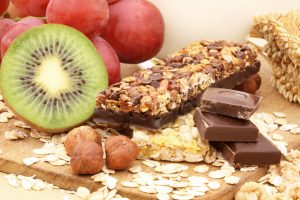 When you head out to your local grocery store, you’re likely enticed by labels on boxes saying, “All Natural” and “Nothing Artificial.” Who wants fake food?
When you head out to your local grocery store, you’re likely enticed by labels on boxes saying, “All Natural” and “Nothing Artificial.” Who wants fake food?
As a consumer, these claims make you feel good that you are purchasing wholesome food for you and your family – food that’s good for you.
Advertisement
Right?
Turns out these labels sometimes can be false (or less than the whole truth).
Eating healthy should not be hard; we should be able to purchase food with confidence in the companies which make and supply them. It’s unfortunate and frustrating to discover we’re buying some products that are not what they claim to be.
Related Reading: The darker side of Greek yogurt
Your ‘all natural’ could be artificial in disguise
Case in point (of many possible label imposters): Kellogg recently settled a class-action suit in regard to its Kashi line, paying out a hefty $5 million. The suit had accused Kashi of misleading people by using the phrase “All Natural” or “Nothing Artificial” on products that contained synthetic and artificial ingredients. Just when you thought those new granola bar flavors – Chocolate Almond & Sea Salt with Chia, anyone? – should be a cupboard staple…
As Kashi describes it: “Sweet and salty flavor plus ALA omega-3 from chia make up one deliciously nutritious, chewy granola bar.”
Those “All Natural” snack bars, crackers and cereals have been promoted as a healthy way of eating, for people who like to ingest good, wholesome ingredients. Front and center, the Kashi website reels us in with, “When we make our foods, we start with simple, natural ingredients – and everything we believe.” Maybe Kashi starts with this notion, but…
Some not so natural ingredients found in Kashi products are pyridoxine hydrochloride, calcium pantothenate, hexane-processed soy ingredients, ascorbic acid, glycerin and sodium phosphate.
Related Reading: Is there plastic in your fast-food sandwich?
Shop smart: Look beyond the label
The Food and Drug Administration (FDA) doesn’t have a set definition of what can be considered natural when it comes to labeling. The stance is once food has been processed, it is likely no longer natural. The FDA is not opposed to products using the term natural as long as there is no added color, artificial flavors or synthetic substances.
Kellogg doesn’t stand alone when it comes to misleading consumers or legal challenges to remove the word “natural” from packaging, the Associated Press reports: PepsiCo Inc. has changed its “Simply Natural” line of Frito-Lay chips to “Simply,” (the ingredients remain the same), and its “Natural Quaker Granola” is now “Simply Quaker Granola.”
How do we choose food that is good for us? For starters, ignore the big flashy labels that promote how healthy or natural something is. This is merely an easy way to grab your attention so you feel good about making that purchase. What really matters is not what’s on the outside of the box, but what’s inside.
Advertisement
Go straight to the ingredient list; this is where you can see for yourself what exactly you’re going to be eating. Rule of thumb here, if you can’t pronounce it, it’s probably not natural or healthy for you. Also note, the order in which the ingredients are listed will indicate the amount of those ingredients. For example, if sugar is listed within the first five ingredients, that means there’s a lot of sugar in there.
These days, food shopping really is buyer-beware. You need to shop smart, plan out your menu and come with a list to guide you through the store.
And if you’re after an easy snack, keep these tips in mind:
- Pick foods that are low in sugar and fat and high in fiber and water
- Naturally sweetened is better than added sweetener
- Fruits, vegetables and whole grains are your best bets (that shiny organic apple sliced with almond butter is nutritious and filling)
- If you need single serving items to go, look for those with less than 100 calories
- Homemade really is gold, so try a simple recipe for granola bars and see how you like them.
